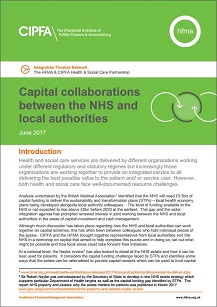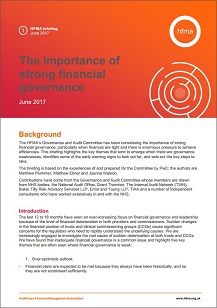Technical / Technical review July 2017
The Department of Health group accounting manual 2017/18 has been published following a delay because of the purdah period prior to June’s election. The consultation draft of the accounting guidance was published in December. Among the main changes from the 2016/17 manual is a revised annex on accounting for pooled budgets and joint arrangements. This replaces previous annexes on the Better Care Fund and other pooled budgets. This guidance has been made more concise with additional information on agency relationships. But there has been no fundamental change to the underlying principles. Previous guidance on disclosures and content of financial statements has been collected in a new ‘Form and content of financial statements’ chapter. Previous guidance on legislation and accounting framework underpinning financial reporting is in a new ‘Financial reporting framework’ chapter.

A new joint briefing paper from the HFMA and CIPFA, Capital collaborations between the NHS and local authorities, aims to clarify the capital financing frameworks in both sectors and raise awareness of the different constraints and systems. For example, local authorities, which adhere to CIPFA’s Prudential code for capital finance in local authorities, generally borrow from the Public Works Loans Board at interest rates determined by the Treasury. Affordability and meeting policy goals or generating a return are the key criteria. NHS bodies, which have different capital frameworks depending on the type of body, have an overriding control of all borrowing to be contained within the Department of Health departmental expenditure limit. The briefing points out that any joint working between the NHS and local authorities must result in assets that do not count against this limit. It looks at possible joint investment schemes.
NHS bodies are increasingly looking to work with other organisations using a range of innovative arrangements. A briefing from the HFMA deals with how joint working arrangements should be accounted for. Accounting for joint working arrangements considers which accounting standards should be applied and what to ask when determining the appropriate accounting treatment. It looks at how the question of who has control can be assessed in accounting terms for the entity and in terms of the preparation of the national accounts. While these questions are being posed to answer an accounting question, they can also be used to tease out governance issues and possible weaknesses in financial management. The briefing considers practical issues such as VAT and governance, as well as difficulties preparing a consolidated set of accounts.
NHS Improvement has added a patient-level information and costing system (PLICS) self-assessment checklist to the approved costing guidance section of its website. The checklist forms one of several quality assurance phases for data to be submitted to the 2016/17 acute PLICS cost collection, to be completed by all trusts participating in the collection. There are 22 questions to be answered – some look at processes, reconciliation and sign-off, others describe data sense checks.

With an increasing focus on financial governance and leadership in providers and commissioners, a new HFMA briefing looks at themes that tend to emerge when there are governance weaknesses, identifies early warning signs and sets out key steps. The importance of strong financial governance – prepared for the HFMA Governance and Audit Committee by PwC – considers: the overoptimistic outlook; poor budgeting with lack of ownership; inadequate financial information; unclear ownership and accountability; lack of escalation of risks and exceptions.
Related content
The Institute’s annual costing conference provides the NHS with the latest developments and guidance in NHS costing.
The value masterclass shares examples of organisations and systems that have pursued a value-driven approach and the results they have achieved.